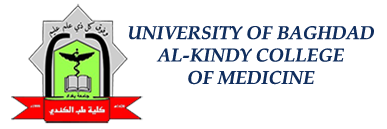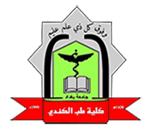History and profile
The clinical biochemistry department was established in the academic year 1998-1999 as an independent branch .it is concerned with teaching clinical biochemistry, chemical pathology in year one, two, three . he department is highly skilled in transferring knowledge and education to the medical students.
The covid 19 pandemic triggered the introduction of new methods of learning in medical education. In an effort not to distract the educational process, the Online distance education is generally delivered to medical students in two main formats: asynchronous distance education, such as recorded videos , and synchronous (live) distance education such as video conferences and virtual classrooms.
Year one:
curriculum focus on clinical biochemistry introductory course
Year two:
the carbohydrates, lipid, protein and minerals metabolism and metabolic pathways are studied in detail in the nutrition and metabolism module, in addition to integrating clinical biochemistry and chemical pathology with other basic science in the digestive, cardiovascular, respiratory, and haemopoietic modules that are taught in year two.
Year three:
the curriculum includes studying the clinical biochemistry and chemical pathology in the endocrine, neuroscience, renal, and reproductive modules as appropriate.
The elective course: is conducted in year four or six with emphasis on the interpretation of laboratory data with the aim of training students for effective diagnosis based on the results of laboratory tests.
Vision
Clinical biochemistry department is to be recognized as a center of excellence that promotes the understanding of the biochemical and molecular events that underlie normal and pathological functions in medicine.
Mission
The department of clinical biochemistry sees as its mission to:
- Offer a high quality courses in biochemistry appropriate for medical students.
- Encourage and ensure high quality research on the part of both faculty and students.
- Develop personal strategies for rapidly identifying and obtaining needed information. This includes developing habits of lifelong learning to maintain awareness of the current state of medical knowledge, and the development of the Intellectual Flexibility needed to respond effectively to problems not previously encountered.
Objectives
The main objective of this department is to provide high quality teaching by:
- Demonstrate knowledge and understanding of the principles that govern the macromolecules structures and their participation in molecular recognition and basic mechanisms of metabolic control and molecular signaling.
- Understand the role biochemistry in health and disease state in different body system in an integrated way.
- Discuss normal biochemical pathways and the etiology and pathogenesis of the biochemical disorders underlying different diseases.
- Understand the interpretation of biochemical data and its integration with the clinical practice of medicine
- Use basic laboratory skills and apparatus to obtain reproducible data from biochemical experiments; and adapt them to plan and carry out simple investigations.
- Analyze, interpret, and participate in reporting to their peers on the results of their laboratory experiments.
- Participate in and report orally on team work investigations of problem-based assignments.
- Build on their knowledge and understanding in tackling more advanced and specialized courses, and more widely to pursue independent, self-directed and critical learning.
- Demonstrates a commitment to the need for continuous learning.
- Develops and implements an ongoing and effective personal learning strategy.
| Name | Academic Degree | CV | Specialty | Title |
|---|---|---|---|---|
| Yasir Abbas Attia Salem Al-Atabi | PhD | CV | Pharmacy / Clinical Biochemistry | Assistant Professor |
| Ikhlas Khalid Hamid Mohammed Al-Abidi | PhD | CV | Pathology/Pathological Chemistry | Professor |
| Huda Salim Hantoosh Hamid Al-Khalidi | Master's degree | CV | Biological Chemistry | Assistant Professor |
| Tahrir Ittihad Kazim Jawad Al-Kazim | PhD | CV | Chemistry / Clinical Biochemistry | Assistant Professor |
| Raghad Emad Al-Din Naji Zain Al-Din Al-Masraf | PhD | CV | Clinical Biological Chemistry | Assistant Professor |
| Raja Mohammed Ali Qasim Al-Mabruk | PhD | CV | Chemistry / Clinical Biochemistry | Lecturer |
| Suhad Taha Mohammed Jado Al-Jubouri | Master's degree | CV | Science in Clinical Biochemistry | Assistant Lecturer |
| Noor Abdul-Karim Taher Mahmoud | Master's degree | CV | Science / Clinical Biochemistry | Assistant Lecturer |
| Saba Thaer Abdulkareem | Master's degree | CV | Science / Clinical Biochemistry | Assistant Lecturer |
| Rajaa Mohammed Ali Qasim | PhD | CV | Science / Clinical Biochemistry | Lecturer |

